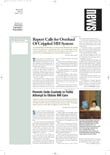Which persons with HIV infection are going to develop dementia from it? There has been no way to predict that. However, when proteins produced by macrophages taken from HIV-infected patients act in a particular way, it may indicate encroaching dementia, a new study suggests.
The study was conducted by scientists from the University of Nebraska Medical Center in Omaha, the University of Puerto Rico Medical Sciences Campus in San Juan, and the First China Hospital Medical University in Shenyang, China. Results were published in the June 24 Neurology.
For several years, certain immune cells in the blood known as macrophages have been known to be implicated in HIV infection of nerve cells in the brain—that is, in the development of HIV dementia. Thus, it’s quite possible that when proteins produced by macrophages taken from HIV patients act in a particular way, it may signal that the macrophages are capable of damaging nerve cells in the brain and causing dementia. So Howard Gendelman, M.D., chair of pathology and microbiology and director of the Center for Neurovirology and Neurodegenerative Disorders at the University of Nebraska Medical Center, and colleagues decided to test this hypothesis.
They selected as subjects 21 women who were infected with HIV, nine of whom also had HIV dementia, and 10 women who had neither HIV nor cognitive impairment. The latter were age-matched with the women with HIV and served as controls. Macrophages were taken from the blood of all 31 subjects, and proteins made by the macrophages were then screened for activity patterns with a relatively new technique called “proteomics protein fingerprinting.”
Certain patterns of macrophage protein activity were found to separate the HIV-infected subjects from the controls with a sensitivity (that is, with an ability to avoid false negatives) of 100 percent and with a specificity (that is, with an ability to avoid false positives) of 80 percent. But even more interesting, a particular pattern of macrophage protein activity was found to distinguish the HIV subjects with dementia from the HIV subjects without dementia with a sensitivity of 100 percent and a specificity of 75 percent.
Thus, the findings bore out the scientists’ hypothesis that proteins made by macrophages act in certain ways when the macrophages are capable of damaging nerve cells in the brain; that is, of causing HIV dementia. The findings also suggest that a simple blood test revealing the distinct protein activity of HIV dementia-causing macrophages might eventually be used to screen HIV patients for dementia risk.
Such a test might even become possible within the next five years, Gendelman told Psychiatric News. He and his colleagues are going to try to confirm their results in a larger group of subjects.
The study was funded by the National Institutes of Health.
An abstract of the study, “Macrophage Proteomic Fingerprinting Predicts HIV-1-Associated Cognitive Impairment,” is posted on the Web at www.neurology.org/cgi/content/abstract/60/12/1931. ▪
Neurology 2003 60 1931
